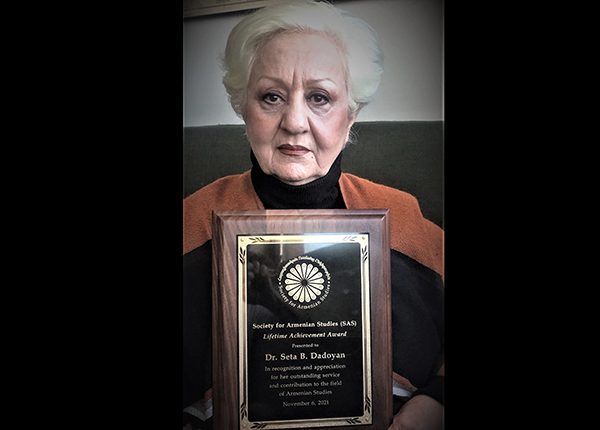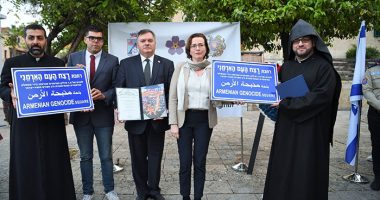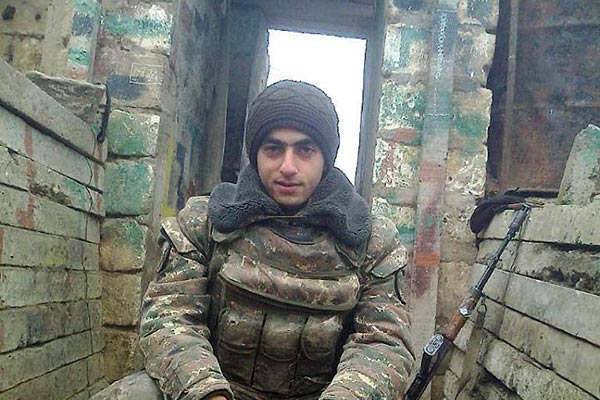On November 6, 2021, the Society for Armenian Studies (SAS) sponsored a special event via Zoom in honor of Professor Seta B. Dadoyan, a prominent scholar of Armenian Studies. Prof. Dadoyan was recognized by SAS for her outstanding service and contribution to the field of Armenian Studies during her more than forty-year career in the field. Born and raised in Aleppo, Syria, Dadoyan is the author of 12 books and more than 50 articles. She received her B.A from Beirut College for Women, M.A from American University of Beirut (AUB) and Ph.D. from V.A.G. Moscow [via Yerevan State University]. Dadoyan was a professor of Cultural Studies, Philosophy, Art and History of Science and Technology at the American University of Beirut (AUB) between 1986 and 2005. She has also taught at other universities including the Haigazian University (1981-1986), Columbia University (2002, 2006), St. Nersess Seminary (2007-2010), and the University of Chicago (2010). She is the first Armenian woman to have received a Doctor of Sciences in Philosophy focusing on the history of Armenian philosophy. Dadoyan’s research concentrates on medieval as well as modern Armenian history with a special focus on the Armenian political, social, and cultural experience of the Armenians in worlds of Islam since its advent in the seventh century. She has been awarded by the “Mesrob Mashtots‘ Medal and Pontifical Encyclical” in 2015, “The Medal and Certificate of David Invictus-Anhaght”, Highest Award of the Armenian Philosophical Academy of the Armenian Academy of Sciences in Yerevan in 1999, elected “Fellow of the Royal Institute for Inter-Faith Studies”, Amman, Jordan in 1997, and the “Uzunian Award for Author of Best Armenian Book” in 1987. The “SAS Lifetime Achievement Award” in Recognition and Appreciation for her Outstanding Service and Contribution to the field of Armenian Studies (2021) is her fourth award.
Prof. Bedross Der Matossian, President of SAS and Associate Professor of History at the University of Nebraska, Lincoln, after providing a brief biographical background of Dadoyan, discussed in detail her contribution to the field of Armenian Studies by concentrating on few important books written by her. He said that Dadoyan’s research on the Armenians during the last century of the Fatimid Caliphate in Egypt demonstrates a phase in the perpetual alliance between heterodox and Muslim Armenians and the Muslims. Der Matossian specifically concentrated on Dadoyan’s trilogy, The Armenians in the Medieval Islamic World, published between 2011-2013. In these three monumental volumes Dadoyan reconstructs the history of the Armenians in the Medieval Islamic World from the Arab period in Arminyah during the seventh century to the eleventh century; from the Armenian realpolitik in the Islamic World and diverging paradigms, as the case of Cilicia through elevenths to the fourteenth centuries; and finally from medieval cosmopolitanism and images of Islam, thirteenth to fourteenth centuries.
In the final section of his introduction, Der Matossian concentrated on her magnum opus entitled Islam in Armenian Literary Culture: Texts, Context, Dynamics (Louvain: Peeters 2021). Der Matossian said that the book is an important contribution on the Armenians’ perception of Islam since its inception and considered it a major contribution not only to the field of Armenian Studies but also to Islamic, as well as Interfaith Studies.
Der Matossian highlighted Dadoyan’s premise, or argument, as she calls it, that if Armenians and Armenia have always been located in the Near/Middle East and the Islamic world, then their history is also a natural part of that region, its peoples, and cultures. Through a close reading of Armenian and Arabic texts from the entire period, Dadoyan in her decades of scholarship portrays a complex and intertwined history that goes beyond essentialization of Armenians in the medieval period to a one that enters into dialogue with the Islamicate Civilization. He said that Dadoyan’s scholarship demonstrates in a subtle manner the necessity of reevaluating and reconceptualizing Armenian and Middle Eastern histories specifically from political, religious, cultural, linguistic, and philosophical perspectives. Following an elaborate introduction, Dadoyan talked about her latest book.
Sharing the Award with the SAS for its esteemed appreciation of her work, Prof. Dadoyan said that as much as the ground she had broken mattered, what mattered more was the road ahead. Existential in many respects, her motive has been the Nietzschean dictum “Sum ergo cogito”, “I exist therefore I think.” It has meant “thinking” about the peculiar condition of being an Armenian native of the Islamic world and making sense of her “Armenianness” in a directly personal and meaningful manner.
She pointed out that after the seventh century, the vast Near Eastern region, where both the Armenian land and the habitat were, became predominantly Islamic. Most Armenians everywhere lived as dhimmīs under Muslim rule. Furthermore, “things Armenian” were simultaneously “things Near/Middle Eastern.” However, she pointed out, Armenian histories barely, if at all reflected the experiences of the Armenians and their institutions in worlds of Islam. She considered this a highly problematic situation at which her scholarship started.
She argued that the total Armenian interactive experiences in the Near/Middle Eastern worlds of Islam had to be re-defined by contemporary critical and interdisciplinary tools, without essentialism and Armenocentrism. This was the objective, she explained, that triggered and motivated her entire intellectual career of almost four decades, during which she published twelve books and dozens of papers and articles. After her discovery of the Islamic sources of Yovhannēs Erznkats‘i (d. 1293) as a graduate, and convinced that there are “things Armenian-Islamic”, she embarked on a lone journey into a twilight zone and unchartered territory. Each research and publication led to the other. She briefly spoke on her six works in the area: Y. Erznkats‘i (1991), The Fāṭimid Armenians (1997), the trilogy The Armenians in the Medieval Islamic World (2011-2013), and her magnum opus, Islam in Armenian Intellectual Culture. Texts, Contexts, Dynamics (2021). In their themes, structure, sources, arguments and dimensions over fourteen centuries, these works are the first in Armenian and Near/Middle Eastern Studies. Her last work, Islam in Armenian Intellectual Culture, is structured around three themes, the “Armenian Mahmet,” the “Armenian Pax Islamica” and the “Armenian Ghurans”. They make a conceptual tripod which supports the great number of textual citations (mostly her translations) and the arguments they generate.
She concluded that her work so far is a statement by the force of the material it makes available for the first time and theses it expounds. “My work,” she added is a “prolegomenon to a novel discipline of Armenian-Islamic Studies within and as part of Armenian as well as Near/Middle Eastern Studies. This discipline must be instrumental to a comprehensive and radical project of re-thinking the entire Armenian experience in the region in its interactive aspects.” “To grow and to be universally relevant”, she added, “Armenian Studies must move, as though from the narrow pond of the Mediterranean, they must cross the Pillars of Hercules, or mainstream norms, into the open ocean of Near/Middle Eastern Studies, their natural habitat.











1 comment
Where can I purchase Prof. Dadoyan’s Islam in Armenian literature book?